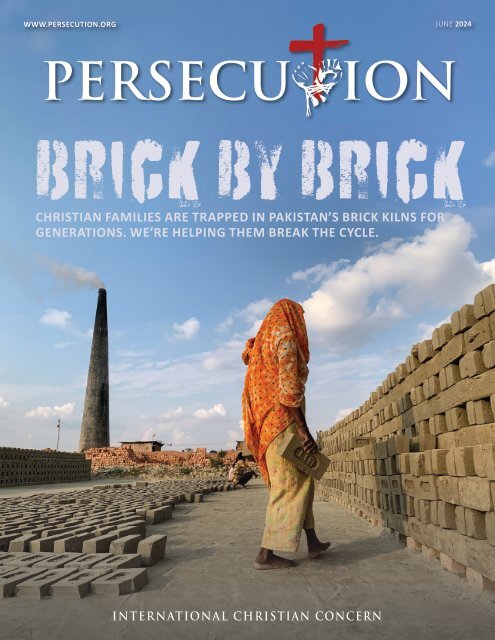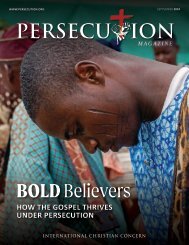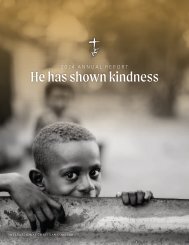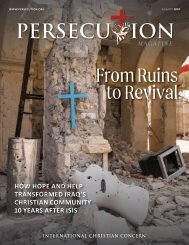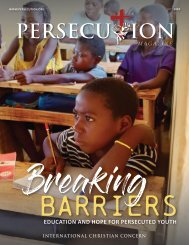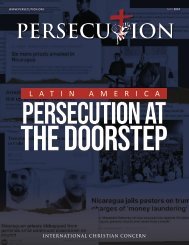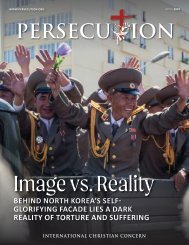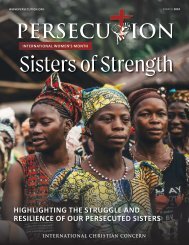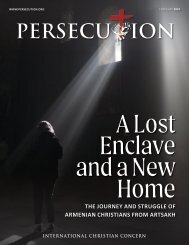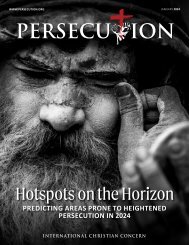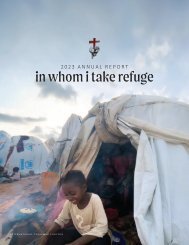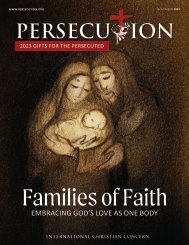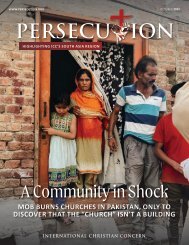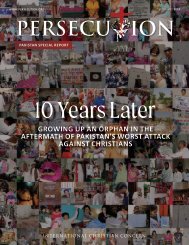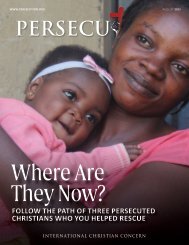June 2024 Persecution Magazine
You also want an ePaper? Increase the reach of your titles
YUMPU automatically turns print PDFs into web optimized ePapers that Google loves.
WWW.PERSECUTION.ORG<br />
JUNE <strong>2024</strong><br />
PERSECU ION<br />
PERSECU ION<br />
CHRISTIAN FAMILIES ARE TRAPPED IN PAKISTAN’S BRICK KILNS FOR<br />
GENERATIONS. WE’RE HELPING THEM BREAK THE CYCLE.<br />
PERSECU ION<br />
PERSECU ION.ORG<br />
INTERNATIONAL CHRISTIAN CONCERN<br />
PERSECU ION.ORG<br />
INTERNATIONAL CHRISTIAN CONCERN<br />
PERSECU ION.ORG<br />
INTERNATIONAL CHRISTIAN CONCERN
Contents<br />
JUNE <strong>2024</strong><br />
ON THE COVER<br />
A woman stacks one of the hundreds of bricks<br />
she must make every day in one of Pakistan’s<br />
brick kilns. These kilns rely on the age-old,<br />
physically demanding practice of making bricks<br />
by hand. Christian families are often forced<br />
to work in these poor conditions. iStock / D.<br />
Talukdar<br />
FEATURES<br />
10<br />
14<br />
16<br />
THE UNSEEN STRUGGLE THAT<br />
HAUNTS GENERATIONS<br />
A system of greed keeps<br />
families trapped for<br />
generations.<br />
THE GIFT OF<br />
NEW LIFE<br />
Rickshaws provide a<br />
way out of indentured<br />
servitude.<br />
HIDDEN<br />
REALITIES<br />
Exploring the lives of<br />
women laborers in<br />
Pakistan’s brick kilns.<br />
RECURRING<br />
04<br />
06<br />
08<br />
20<br />
22<br />
ICC NEWSROOM Your Source for <strong>Persecution</strong> News<br />
WEST WATCH Issues Involving Christianity in the West<br />
YOUR HANDS AND FEET ICC Projects Made Possible by Our Supporters<br />
“I AM THE WORST” A Prayer for the Oppressors<br />
CROWNS OF COURAGE Highlighting Those Who Have Sacrificed Everything for Christ<br />
@persecuted @persecutionnews @internationalchristianconcern International Christian Concern<br />
OUR MISSION: Since 1996, ICC has served the global<br />
persecuted church through a three-pronged approach of<br />
advocacy, awareness, and assistance. ICC exists to bandage<br />
the wounds of persecuted Christians and to build the church<br />
in the toughest parts of the world.<br />
DONATIONS: International Christian Concern (ICC) is a nonprofit 501(c)(3) (all<br />
donations tax-deductible). ICC makes every effort to honor donor wishes in regards to<br />
their gifts. Occasionally, a situation will arise where a project is no longer viable. ICC<br />
will redirect those donated funds to one of our other funds that is most similar to the<br />
donor’s original wishes.<br />
2<br />
<strong>Persecution</strong> | JUNE <strong>2024</strong><br />
© Copyright <strong>2024</strong> ICC, Washington, D.C., USA. All rights<br />
reserved. Permission to reproduce all or part of this publication<br />
is granted provided attribution is given to ICC as the source.<br />
2020 Pennsylvania Ave. NW #941 | Washington, DC 20006-5441<br />
STAFF<br />
Publisher Jeff King<br />
Managing Editor Alex Finch<br />
Editor and Designer Hannah Campbell
Rescue Pakistan!<br />
Modern day slavery ... what else do you call it? In Pakistan, as an<br />
uneducated Christian, there are often three main job choices:<br />
• Street sweeper<br />
• Sewer worker, where the waste of the city flows<br />
• Brick kiln worker, where you are enslaved by your debt and<br />
can never break free<br />
All of these are menial jobs at the bottom rung of society and several<br />
of these jobs cannot be filled by Muslims (these jobs are for the<br />
slaves only).<br />
Christians suffer terrible job and educational discrimination (by design)<br />
and remain trapped as semi-slaves to their captors.<br />
To help, some organizations pay the debts of the brick kiln workers to<br />
rescue them. This is done sincerely but it enriches the owners of the<br />
brick kilns. It merely creates the illusion of saving believers, but the<br />
Christians end up going back to work in the kilns, as it’s all they know!<br />
We’ve worked in Pakistan for 20 plus years and have seen all the<br />
tricks! So, here’s what we do! We only work with those whose debts<br />
have been paid.<br />
We then give them a simple readymade business that will work regardless<br />
of their skills or entrepreneurial ability to keep them out of<br />
the kilns for good. We’ve seen families have great success with giving<br />
them motorized rickshaws that they use as taxis or business delivery<br />
services.<br />
We are committed to ending the slavery of believers in Pakistan and<br />
are incredibly grateful for your partnership in this life-changing ministry!<br />
JEFF<br />
Jeff King, President<br />
International Christian Concern<br />
Author: The Whisper (NEW!), The Last Words<br />
of the Martyrs, and Islam Uncensored<br />
Discover the Life-Changing Lessons<br />
of the Persecuted<br />
ICC President and author Jeff King has released his third book,<br />
The Whisper. In this 30-day devotional, King presents stories of<br />
persecuted believers and unpacks their spiritual wisdom as they<br />
walk with the Lord through trials and triumphs. How are they<br />
able to endure such suffering and remain joyful in the Lord? What<br />
lessons can we learn from them?<br />
Visit www.persecution.org/books<br />
Out<br />
Now!<br />
PERSECUTION.ORG 3
ICC Newsroom<br />
YOUR SOURCE FOR PERSECUTION NEWS<br />
BREAKING NEWS<br />
ADF Militants Attack Village Midday,<br />
Kill at Least Seven People<br />
At least seven people were killed on<br />
Tuesday, April 2, as members of<br />
the Allied Democratic Forces (ADF)<br />
carried out a midday attack on the village<br />
of Mangodomu, located in Mangina, Beni<br />
territory, in DRC’s North Kivu province.<br />
Nicaise Kyora, president of the youth<br />
parliament of Mangina, confirmed the<br />
deaths, adding that others were taken<br />
hostage, and the local Christian health<br />
center had been looted and set on fire.<br />
“The rebels entered Mangina without<br />
being noticed,” Kyora explained. “It was<br />
at the Ballon roundabout that it crackled<br />
with bullets in the air. At least seven<br />
people were killed, including a woman.<br />
After the ADFs went to the [health] center<br />
of Mangodomu, which they looted before<br />
burning it down, some nurses were taken<br />
hostage.”<br />
In recent times, the ADF has violently<br />
targeted Christian hospitals and churches<br />
in DRC to disrupt peace and stability in<br />
the region. One such devastating incident<br />
occurred at the CECA 20 (Evangelical<br />
Community of Central Africa) hospital of<br />
Mangodomu, where the ADF militants set<br />
the facility on fire, leading to considerable<br />
damage and chaos. Tragically, some nurses<br />
working at the hospital also went missing<br />
following this attack.<br />
Tensions<br />
Remain as<br />
Negotiations<br />
Stall over the<br />
Armenia-<br />
Azerbaijan<br />
Border<br />
Tensions in the South Caucasus<br />
remain high as negotiations stall<br />
over the disputed territory along<br />
the Armenia-Azerbaijan border.<br />
Despite the ethnic-Armenian<br />
forces within the Nagorno-<br />
Karabakh/Artsakh region<br />
surrendering to the Azerbaijani<br />
military in September 2023, a<br />
formal peace treaty between<br />
Baku and Yerevan has not yet<br />
been finalized.<br />
On March 16, Azerbaijani officials<br />
demanded that Yerevan cede four<br />
villages near the Gazakh region<br />
in the former’s northwest and<br />
the Tavush region in the latter’s<br />
northeast. Baku also claims four<br />
other villages — three of which<br />
are within Armenian territory<br />
in the north and the fourth in<br />
Armenian territory in the south.<br />
Azerbaijanis inhabited these eight<br />
villages before Armenia took<br />
control of the territory during<br />
the first armed conflict in the late<br />
1980s/early 1990s.<br />
4<br />
<strong>Persecution</strong> | JUNE <strong>2024</strong>
VISIT OUR WEBSITE, PERSECUTION.ORG, FOR THE LATEST NEWS<br />
State in Heart of India Sees Highest<br />
Number of Attacks Against Christians<br />
The Central Indian state of Chhattisgarh<br />
tops the list of Indian states with the highest<br />
number of attacks against Christians so far<br />
this year, according to a press release from<br />
United Christian Forum (UCF).<br />
A total of 161 incidents of violence against<br />
Christians were reported from January<br />
through March 15 via the helpline of the<br />
New Delhi-based civil society organization,<br />
which focuses on Christians in India. Of<br />
this number, 47 incidents of violence<br />
and discrimination were reported from<br />
Chhattisgarh.<br />
Across India, there were 70 incidents of<br />
violence against Christians in January,<br />
followed by 62 incidents in February,<br />
according to the press release. Another 29<br />
incidents occurred during the first 15 days<br />
of March.<br />
The incidents include a wide range of<br />
violence, including attacks on churches<br />
and prayer meetings, physical assaults,<br />
harassment, ostracization, limiting access<br />
to community resources, and false<br />
allegations, particularly those pertaining<br />
to “forced conversions.”<br />
Al-Shabab Kills Christians During<br />
Multiple Attacks in Kenya<br />
During the morning of Tuesday, April 9,<br />
suspected al-Shabab members killed a<br />
farmer in Bobo, Hindi, a Christian village<br />
in Kenya that the Islamic extremist group<br />
attacked in 2022.<br />
Later that afternoon, the militants<br />
barricaded a road in the Milihoi area in<br />
Lamu County, a route between Mpeketoni<br />
and Hindi they travel often. They shot two<br />
travelers and set several vehicles on fire.<br />
Lamu West Deputy County Commissioner<br />
Gabriel Kioni confirmed the attack and<br />
stated that only one person had died and<br />
that two people suffered minor injuries.<br />
Security officers responded quickly to the<br />
attack and pursued the extremists but<br />
were unable to apprehend them. After<br />
additional security officers arrived, vehicles<br />
traveling through Lamu were stopped and<br />
inspected.<br />
“We spent the night awake and alert since<br />
we know that the terrorists like attacking<br />
during or at the end of the holy month of<br />
Ramadan,” an ICC staffer said.<br />
U.S. Officials<br />
Voice Concern<br />
for Vietnamese<br />
Religious<br />
Freedom<br />
Advocates<br />
The U.S. State Department<br />
expressed deep concerns for the<br />
ongoing harassment, persecution,<br />
and convictions of Vietnamese<br />
religious freedom advocates, in<br />
an April 1 statement.<br />
In the release, the State<br />
Department addressed the case of<br />
Protestant missionary Y Krec Bya,<br />
who received a 13-year sentence<br />
for allegedly “sabotaging national<br />
unity” in Vietnam.<br />
International Christian Concern<br />
has highlighted several of these<br />
cases in recent years, particularly<br />
regarding ethnic minority Christian<br />
groups like the Montagnards.<br />
The State Department is calling for<br />
the release of these prisoners and<br />
for the ruling Vietnamese Party to<br />
respect freedom of association,<br />
assembly, and religion.<br />
PERSECUTION.ORG 5
On April 1, the Scottish Parliament officially passed the Hate<br />
Crime and Public Order Act, which creates restrictions<br />
punishing hate speech. The act, which received mass<br />
criticism in Scotland, defines the offense as a person either<br />
behaving “in a manner that a reasonable person would consider<br />
to be threatening, abusive or insulting, or communicat[ing]<br />
to another person material that a reasonable person would<br />
consider to be threatening.”<br />
Once the legal counsel meets this portion of the offense, they<br />
must prove that the offender either intended to “stir up hatred<br />
against a group of persons based on the group being defined<br />
by reference to race, color, nationality, or ethnic or national<br />
origins” or “a reasonable person would consider the behavior<br />
or the communication of the material to be likely to result in<br />
hatred being stirred up against such a group.”<br />
While the limits defined by the bill may seem extreme and<br />
unreasonable, other countries with Hate Speech laws, such as<br />
the United Kingdom and others across the European Union,<br />
have prosecuted Christians for voicing their opinions regarding<br />
issues of gender or sexuality. While many would not perceive<br />
the actions as threatening or harmful, others continually express<br />
personal offense they take by the words of others. While no bill<br />
is perfect, the Hate Crime and Public Order Act does provide<br />
the right to freedom of expression guaranteed by the European<br />
Convention on Human Rights, which protects “ideas that offend,<br />
shock, or disturb.”<br />
Protection of human rights and freedom of speech is a top<br />
priority for many Western democracies, including the United<br />
States. However, with continued advances toward broadening<br />
the definitions and punishments for hate speech, the West<br />
is experiencing a deterioration in the practice of freedom of<br />
thought, conscience, and speech.<br />
West Watch<br />
ISSUES INVOLVING CHRISTIANITY IN THE WEST<br />
Scotland Passes Bill Outlawing Hate Speech,<br />
Effectively Limiting the Rights of Religious Groups<br />
NCAA Women’s Coach Criticized for Sharing Her Beliefs<br />
The Freedom From Religion Foundation publicly criticized the<br />
University of South Carolina for the statements made by Dawn<br />
Staley, head coach of the University’s women’s basketball team.<br />
Staley, a devout Christian, frequently makes bold statements<br />
about the provisions of God when interviewed about the team’s<br />
performance. In a recent interview after the team’s win in the final<br />
four, Staley said, “If you don’t believe in God, something’s wrong<br />
with you.” In response to these words and Staley’s continued<br />
profession of her faith, Co-President of FFRF, Annie Lauri Gaylor,<br />
told reporters that; “Coach Staley is coercing her students to<br />
adopt religion even beyond the ‘pray to play’ notion. Her insults<br />
to all those who don’t believe in her particular religion cannot be<br />
countenanced by a public university.” Following the FFRF’s public<br />
call for the University to regulate Staley’s statements, Staley<br />
posted on social media platform X (formerly Twitter), “If you’re<br />
a nonbeliever, it wasn’t for you. Wish you well with your beliefs.”<br />
6<br />
<strong>Persecution</strong> | JUNE <strong>2024</strong>
POCKET POLICY<br />
What Putin’s Re-Election<br />
Means for Christians<br />
President Vladimir Putin of Russia was re-elected on March 15<br />
for his fifth presidential term. Ruling for nearly a quarter-century,<br />
Putin received 87% of the vote in the election.<br />
Once Putin reaches the end of his fifth term, he will be the longestserving<br />
Russian leader since Catherine the Great, who ruled in the<br />
18th century. Generally, religious freedom issues in Russia do not<br />
significantly affect the largest Christian denomination present in<br />
the country. Approximately 71% of Russia’s population identifies<br />
as Orthodox Christians, which is Putin’s professed religion. While<br />
Orthodoxy is one religion protected under the constitution, the<br />
government simultaneously prohibits violating public order and<br />
extremist activity, which are not defined.<br />
Religious groups that typically endure government persecution<br />
include Protestants and Roman Catholics. NGO groups have<br />
reported several attacks on protestant churches and confiscations<br />
of religious literature. Russian officials frequently arrest<br />
missionaries for “illegal” work, including the recent arrest of a<br />
South Korean Christian missionary.<br />
Additionally, religious persecution of Ukrainians remains high<br />
during the time of war between the two countries. Several NGOs<br />
reported the detention and deaths of specifically protestant<br />
civilians in the city of Mariupol in March of 2022.<br />
Despite the legal freedom of religion protected in the constitution,<br />
actions that the Putin regime interprets as criticism have resulted<br />
in severe punishment. The continued suppression of all freedoms,<br />
including freedom of religion, is expected because of the new<br />
election. Despite Putin’s claim as the protector of Christianity, the<br />
limitations placed on Russian citizens to act on free will limit the<br />
scope of human free will generally.<br />
H.R.3012<br />
North Korean Human<br />
Rights Reauthorization<br />
Act of 2023<br />
The reauthorization of the North Korean Human<br />
Rights Act of 2004, originally introduced by<br />
Rep. Young Kim of California, discusses several<br />
issues of the perpetuation of human rights<br />
issues, including that of religious freedom.<br />
Under subsection 10 of the “Findings” portion<br />
of the bill, it says, “North Korea continues to<br />
bar freedom of religion and persecute religious<br />
minorities, especially Christians. Eyewitnesses<br />
report that Christians in North Korea have been<br />
tortured, forcibly detained, and even executed<br />
for possessing a Bible or professing Christianity.”<br />
The recognition and continued emphasis on<br />
issues of religious freedom in North Korea<br />
by Rep. Kim highlights the atrocities against<br />
Christians particularly. In place since 2004, the<br />
reauthorization of the North Korean Human<br />
Rights Act would express grave concern on<br />
behalf of the United States and enforce the<br />
continued fight against the oppressive regime<br />
currently active in North Korea.<br />
PERSECUTION.ORG 7
Your Hands and Feet<br />
ICC PROJECTS MADE POSSIBLE BY OUR SUPPORTERS<br />
The Promise of Living Water<br />
AFRICA<br />
Rufinah met her husband, Boniface, years<br />
ago in a Kenyan town near the Somalia border. Boniface, a<br />
water-drilling machine assistant operator, worked tirelessly<br />
to help more people access safe drinking water in Somalia.<br />
On Sept. 30, 2022, al-Shabab killed Boniface, three of his<br />
friends, and four nonlocal Christians at a water drilling<br />
site. Rufinah, who was pregnant at the time, was left<br />
devastated. Soon, she delivered their baby and started<br />
raising the sweet boy on her own.<br />
Without any means to financially support herself or her<br />
son, Rufinah soon fell into despair. But then she became<br />
friends with an International Christian Concern (ICC) staff<br />
member. ICC provided Rufinah with materials to open a<br />
shop to sell household goods. Rufinah can now provide for<br />
herself and her son, ensuring a more secure path for their<br />
family.<br />
“I am immensely grateful for ICC’s unwavering support<br />
and kindness,” Rufinah said. “They’ve been like guardian<br />
angels to us by providing hope and encouragement during<br />
our darkest days. Thank you, ICC, for your compassion and<br />
generosity. You’ve given us the strength to face the future<br />
with hope and optimism.”<br />
We praise God that following the loss of Boniface, the man<br />
who provided water for so many, the Lord has brought<br />
living water to the lives of Rufinah and her son. It is a<br />
reminder of Christ’s words in John 4:14: “But whoever<br />
drinks of the water that I will give him will never be thirsty<br />
again. The water that I will give him will become in him a<br />
spring of water welling up to eternal life.”<br />
We praise God that the Lord so clearly provided for<br />
Rufinah in her time of need, proving his omnipotence and<br />
faithfulness.<br />
8<br />
<strong>Persecution</strong> | JUNE <strong>2024</strong>
A Father’s Love<br />
MIDDLE EAST Benjamin suffers from a disability that makes<br />
it very difficult for him to find work, and often resorts to begging<br />
on the streets. A few years ago, his wife had an affair with a Muslim<br />
neighbor, and she eventually divorced Benjamin and married<br />
the neighbor. Benjamin refused to let the children live with their<br />
mother and convert to Islam but was forced to move and rent a<br />
new apartment that he struggles to pay. ICC helped set him up with<br />
a small grocery store to generate a living for his family and pay rent.<br />
Benjamin was overwhelmed with tears while thanking God for his<br />
gifts to the family. He told us, “God looked at my broken heart and<br />
sympathized with me, and I am not sad for what my wife did and<br />
I forgive her. All I care about is raising my children in fear of God.<br />
Please remember my family in your prayers.”<br />
His mother cried and said, “Benjamin is a good man and he suffered<br />
a lot because of his wife, and there are still many challenges ahead<br />
of him in raising his children. Thank you for the support you gave<br />
him.”<br />
Our staff implementing the project said that although he is very<br />
poor and disabled, he refused to abandon his children and leave<br />
them with their mother. “My children were born Christians and will<br />
remain Christians. And I will do whatever it takes to protect them,”<br />
Benjamin said. “I lost my wife, but I would rather die than abandon<br />
my children.”<br />
Benjamin will also be able to send his children to school with<br />
the extra income, saying, “I am so grateful. I hope my project<br />
will succeed and my children, especially my eldest daughter, will<br />
be able to overcome the trauma she experienced because of her<br />
mother. Pray for my children to know Jesus.”<br />
Mary’s Testimony of Faith Amid Grief<br />
AFRICA Last August, al-Shabab militants ambushed Kaingu<br />
who was on his way to deliver goods to Lamu. He was crossexamined<br />
and killed as soon as the terrorists discovered he was<br />
a Christian.<br />
“This was a great loss to us as a young family and we wished that<br />
he could be with us longer,” said his widow, Mary. “But we strongly<br />
believe that the Lord has His plans that cannot be thwarted. He<br />
does whatever glorifies him and what builds us in faith.”<br />
Kaingu was a long-distance driver who used to take goods to<br />
different part of the Kenyan coast and known to be a trustworthy<br />
and dedicated worker.<br />
“We have got no complains to God since He doesn’t sin. We<br />
“We strongly believe that the lord has<br />
his plans that cannot be thwarted. He<br />
does whatever glorifies him and what<br />
builds us in faith.” — Mary, widow<br />
have been praying for strength to cope with this loss and we are<br />
seeing Him answer our prayers. We thank you for the food aid and<br />
financial assistance you have given us.”<br />
ICC provided Mary and her two daughters with clothing, rent,<br />
food, and money to start her own small business.<br />
PERSECUTION.ORG 9
The Unseen<br />
Struggle<br />
that Haunts<br />
Generations
Christians in<br />
Pakistan are<br />
often forced<br />
into the<br />
backbreaking<br />
work of<br />
making bricks.<br />
A system of<br />
greed keeps<br />
their families<br />
trapped for<br />
generations.<br />
BY ICC’S SOUTH ASIA TEAM<br />
In the heart of Pakistan, where<br />
diversity is celebrated and cultural<br />
richness flows through the veins<br />
of its people, a sinister reality lies<br />
hidden, a reality that strikes at the<br />
core of humanity. Hundreds of<br />
thousands of families have endured<br />
generations of servitude within the<br />
unforgiving bounds of the brick kilns.<br />
Let us journey into the shadows of<br />
their existence, where despair and<br />
exploitation intertwine, leaving<br />
behind scars that time cannot heal.<br />
Amid the breathtaking tapestry<br />
of Pakistan’s cultural diversity and<br />
linguistic richness lies a heartwrenching<br />
tale of suffering and<br />
struggle that often goes unnoticed.<br />
In the shadows of urban areas,<br />
where the roar of progress deafens<br />
the cries of the marginalized, the<br />
brick kiln workers of Pakistan toil in<br />
a relentless cycle of despair.
Pakistan boasts a mix of 512 ethnic groups<br />
and 74 language groups, a reflection of its<br />
vibrant soul. Amid this diversity, however,<br />
lies a dark tale of around 20,000 brick kilns<br />
that dot the landscape, predominantly<br />
congregating near urban areas. Within<br />
the blazing heart of these kilns, 4.5 million<br />
souls toil, producing a staggering 1,000<br />
bricks each day for a mere pittance of<br />
960 rupees ($3.50). The kilns blaze at<br />
temperatures reaching a scorching 2,012<br />
degrees Fahrenheit.<br />
These brick kiln laborers, often unseen and<br />
unheard, are among the most marginalized<br />
and vulnerable in Pakistan. Lacking skills<br />
and resources, they labor under dire<br />
conditions, deprived of necessities such<br />
as healthcare, education, and sanitation.<br />
12<br />
<strong>Persecution</strong> | JUNE <strong>2024</strong><br />
Their grueling workdays, which can total<br />
12 agonizing hours, yield meager wages,<br />
sometimes as low as 700 rupees ($2.52)<br />
per day. Temporary shelters, their only<br />
refuge, offer scant ventilation and expose<br />
them to the threat of fires and accidents.<br />
A CYCLE OF DEBT AND DESPAIR<br />
A seemingly innocuous loan sets in<br />
motion a cycle of bondage that clenches<br />
generations in its cruel grip. The workers,<br />
ensnared in this web of exploitation, are<br />
kept in shadows, their accounts hidden<br />
from their eyes. For these millions who<br />
suffer, hopelessness stretches before<br />
them.<br />
Debt spirals like a storm gathering<br />
momentum, swallowing families whole.<br />
Illnesses, inclement weather, deaths,<br />
marriages, and births — the very fabric of<br />
life — force these workers into the jaws of<br />
this insidious trap. Falling sick or bearing<br />
a child becomes an iron chain, tethering<br />
them to the kilns until debts are repaid.<br />
To add to the challenges, they are unable<br />
to work during the rainy season which can<br />
last months, setting them further back<br />
with the debts they accumulate during this<br />
time while they are out of work.<br />
High interest loans, corrupt officials,<br />
surreptitious deductions, and doctored<br />
accounts cripple these laborers further,<br />
while their already desperate living<br />
conditions degrade even further. An<br />
agonizing helplessness blankets them as<br />
debts escalate year after year. Families<br />
torn apart, lives shattered — some<br />
surrender, paying the ultimate price of<br />
despair through suicide.<br />
A GENERATION HELD CAPTIVE<br />
The Global Slavery Index bears witness to<br />
an alarming truth — nearly 90% of these<br />
workers are ensnared in forced labor.<br />
Even though it’s illegal to employ those<br />
younger than 16, almost 70% of bonded<br />
laborers in Pakistan are children, robbed<br />
of their innocence and potential. These<br />
young souls trade classrooms for kilns,<br />
their education sacrificed on the altar of<br />
servitude.<br />
Remote brick kilns, hidden away in<br />
Pakistan’s rural heart, elude scrutiny and<br />
regulation, festering in obscurity. Workers<br />
live in squalor, the very soil they manipulate<br />
to mold bricks giving rise to skin diseases.<br />
Billowing smoke releases toxic fumes,<br />
triggering asthma, tuberculosis, and a grim<br />
array of afflictions. Kiln owners, joined<br />
by corrupt officials, keep these workers<br />
shackled, wielding the law as a weapon<br />
against those they oppress.<br />
THE CHILDREN OF KILNS: A STOLEN<br />
FUTURE<br />
Innocence shattered, childhoods stolen,<br />
the children of these kilns live lives robbed<br />
of the most basic rights. No church, no<br />
Sunday school, no formal education —<br />
instead, they inherit the skill of brickmaking.
They lack toys, their laughter silenced<br />
as they endure a life denied its natural<br />
course. Opportunities for growth are<br />
luxuries.<br />
Child labor thrives in this unforgiving<br />
environment, with the International<br />
Labour Organization estimating a<br />
grim reality — 4.2 million children<br />
in Pakistan, hands that should hold<br />
pencils, instead wield tools of toil at<br />
the kilns. A relentless cycle of labor,<br />
lasting up to 16 hours a day, steals<br />
their youth, leaving them with paltry<br />
earnings, sometimes as little as 300<br />
rupees ($1.08).<br />
A GLIMMER OF HOPE AMID THE<br />
ASHES<br />
Pakistan’s Supreme Court’s voice<br />
has recognized the rights of brick<br />
kiln workers, but change is still<br />
elusive. Only a handful of kilns have<br />
embraced environment-friendly<br />
technology, while the majority cling<br />
to outdated practices, driven by fear<br />
of financial upheaval. The zigzag<br />
technology’s promise of efficiency and<br />
eco-friendliness, like an oasis in the<br />
desert, holds potential, yet much work<br />
remains to be done.<br />
Brick kiln workers continue to suffer,<br />
hidden beneath layers of injustice,<br />
their stories eclipsed by the enormity<br />
of their struggle. Their tears mingle<br />
with the sweat that molds the bricks<br />
that build cities. It’s a call to action,<br />
a plea to shatter these chains of<br />
bondage, to let their stories kindle a<br />
fire that ignites change, so that future<br />
generations no longer bear the yoke of<br />
cruelty.<br />
PERSECUTION.ORG 13
The Gift of New Life<br />
Rickshaws provide a way out of indentured servitude.<br />
BY ICC’S SOUTH ASIA TEAM<br />
When Christians are freed from the bondage of working<br />
in Pakistan’s brick kilns, they often don’t have the<br />
skills they need to support themselves — let alone<br />
their families — outside of the kilns. For many, brick kilns are<br />
the only life they’ve ever known.<br />
Everything changes with the gift of an auto-rickshaw, and<br />
International Christian Concern (ICC) has given — and<br />
continues to give through its Community Development fund —<br />
new, dependable rickshaws to Christian families recently freed<br />
from the brick kilns.<br />
“Driving a rickshaw is the most lucrative occupation for these<br />
people,” an ICC staff member said. “So many of them know<br />
nothing beyond the kilns and as a result, have little to no skills<br />
beyond making bricks, but everyone can drive a rickshaw. You<br />
don’t need a degree, you don’t need special training, you don’t<br />
even need a license. Everyone uses rickshaws in Pakistan to<br />
either transport themselves or goods. You can make your own<br />
hours, be flexible in where you work, and make a sustainable<br />
living depending on how many trips you take. For the first time,<br />
these people are in control of their lives. They decide when,<br />
where, and how much they work, not a landowner who abuses<br />
them and their family.”<br />
THANKFUL RECIPIENTS<br />
Rickshaws, tuk tuks, or “chingchi” as they’re often called in<br />
Pakistan, are the most common form of transportation in the<br />
South Asia. The small, colorful two- or three-wheeled vehicles<br />
are often decorated to reflect the personality of the driver<br />
and the local culture. The decorations are as much a personal<br />
expression as they are an attempt to catch the eye of potential<br />
customers.<br />
In Pakistan, it is common to see rickshaws adorned with Islamic<br />
art. Bold Christians will decorate their rickshaws with a cross or<br />
a picture of Jesus Christ.<br />
Christians in Pakistan are often called “churha,” a derogatory<br />
term reserved for low caste sanitation workers. If believers<br />
aren’t working in one of Pakistan’s brick kilns, they are often<br />
working another poorly paid job in the sanitation industry,<br />
including sewage workers or street sweepers.<br />
Becoming a rickshaw driver isn’t always an easy financial move.<br />
Drivers often rent rickshaws, the cost of which cuts into their<br />
daily earnings. Those who receive their own rickshaw from ICC,<br />
however, can take home their full earnings and adequately<br />
provide their families with adequate food and education.<br />
14<br />
<strong>Persecution</strong> | JUNE <strong>2024</strong>
In late 2023, ICC distributed rickshaws to Christians and<br />
their families in Pakistan.<br />
When Abdul received his new rickshaw, he couldn’t<br />
believe it.<br />
“We are pleasantly surprised to have a new rickshaw,”<br />
he said. “It will turn our financial situation and fortune.<br />
We feel so blessed that our Christian brothers and<br />
sisters are worrying for our lives. God has transformed<br />
our lives while coming us to the stage where we are<br />
able to start the new business.”<br />
After leaving the brick kiln, Wasim had long had a dream<br />
of owning his own rickshaw. When an ICC staff member<br />
handed him the keys to one, he smiled with gratitude.<br />
“We feel so blessed that<br />
our Christian brothers and<br />
sisters are worrying for our<br />
lives. God has transformed<br />
our lives while coming us to<br />
the stage where we are able<br />
to start the new business.”<br />
— ABDUL, FORMER BRICK KILN WORKER<br />
“It’s like a dream coming true,” he said. “We were<br />
hopeless to think of getting out of the brick kiln work<br />
and especially starting a new business. May God help<br />
you the way you helped us.”<br />
Ibrahim and his family are grateful for getting out of<br />
the brick kilns. They shared with ICC how they worked<br />
in bad conditions and were unable to work during<br />
Pakistan’s long rainy season. Now they can earn income<br />
year-round.<br />
“It’s a super privilege to have rickshaw for our<br />
livelihood,” he said. “Now our family will earn good<br />
(income), and we will accelerate financially. May God<br />
bless you abundantly.”<br />
A LASTING DIFFERENCE<br />
Christians who receive rickshaws from ICC are not only<br />
able to provide for their families, but they’re also free<br />
from worrying about having to return to the brick kilns<br />
just to survive.<br />
In their newfound freedom, previous beneficiaries of<br />
rickshaws have used the drive time to share the gospel<br />
with their passengers. Some do even more with their<br />
rickshaw income.<br />
“We saw how they were profitable and poured into<br />
their community while earning a dependable and<br />
sustainable income for their family,” the ICC staff<br />
member said of other rickshaw recipients. “A welcome<br />
surprise was that these beneficiaries were evangelizing<br />
to their patrons and using some of their income to build<br />
new churches. This was not necessarily intended when<br />
the projects were approved but will now be an added<br />
factor in the proposal process.”<br />
PERSECUTION.ORG 15
16<br />
<strong>Persecution</strong> | JUNE <strong>2024</strong>
Hidden<br />
Realities<br />
Exploring the Lives of Women Laborers in Pakistan’s Brick Kilns<br />
BY HANNAH CAMPBELL<br />
Amid the steady hum of chatter exists a silent symphony of suffering where women toil day and night to<br />
meet not only their brick quota, but their growing family’s needs. Yet, as they labor every day to support<br />
their families in unforgiving heat, their own well-being fades into the background.<br />
During what should be a beautiful and life-giving time for expecting mothers, these women consistently<br />
lack access to proper healthcare during their pregnancies. With each family working at the kilns averaging<br />
seven to nine children, women are constantly pregnant. But the emphasis for these mothers is placed on<br />
brick output — and their quota doesn’t decrease when they’re pregnant. Due to this, women’s health<br />
suffers, and babies, if they live to full term, are often born with health complications.<br />
PERSECUTION.ORG 17
Meera, Rani, Ayesha, and the Dia Ama (left to right) at one of the brick kilns ICC visited. Each woman shared their stories of loss and<br />
hardship throughout their lives at the kilns.<br />
ICC developed a comprehensive plan to<br />
address major issues at the brick kilns<br />
and is creating successful livelihood<br />
projects to keep families out of the kilns<br />
once their debts are paid off. One area<br />
of focus is women’s health.<br />
During our last visit to one of the kilns,<br />
we met and interviewed women to hear<br />
their experiences to better inform our<br />
work. The issue was glaring — women at<br />
the brick kilns don’t possess the proper<br />
knowledge to take care of themselves,<br />
which can lead to devastating outcomes.<br />
Maya is 19 years old and has spent the<br />
past 14 years working at the brick kilns.<br />
Since age 5, she has been immersed in<br />
the grueling work of forming bricks with<br />
her family.<br />
“The harsh weather and the conditions<br />
increase the risk of heat strokes due to<br />
the direct heat exposure, both from the<br />
sun and from the fiery kiln,” she shared<br />
with ICC. Heat strokes and dehydration<br />
are frequent issues for many in this<br />
environment.<br />
But it’s not just the physical labor<br />
that weighs her down. Maya began<br />
menstruating at the age of 14 and used<br />
an unsanitary cloth, which has led to<br />
recurring health issues throughout the<br />
years. Each month she endures cramps<br />
that are amplified by the heat and<br />
physical labor, yet she must endure the<br />
pain and continue to meet her daily<br />
brick quota.<br />
Girls often experience their first<br />
menstrual cycle while they are working<br />
at the kilns, and because they’re not<br />
in school, they don’t learn sanitary<br />
methods to address their monthly<br />
needs. The topic is often too taboo to<br />
discuss with family, so these young girls<br />
are left to take care of their health on<br />
their own.<br />
For Meera, another young woman<br />
working at the kiln, her pregnancy<br />
journey turned into tragedy because of<br />
medical misinformation. She was eight<br />
months pregnant with her first boy,<br />
and despite this, she was still working<br />
alongside everyone else forming bricks.<br />
A community midwife known as the<br />
Dia Ama visited Meera and gave her<br />
medicine to alleviate her pregnancy<br />
pains. However, the “medicine” that she<br />
took inadvertently led to the miscarriage<br />
of her son shortly after.<br />
The demand of the job coupled with the<br />
pains of pregnancy and the lack of basic<br />
medical knowledge led to the tragic<br />
loss of Meera’s son. Mother at the kilns<br />
also don’t have an adequate diet while<br />
they’re pregnant or nursing, which leads<br />
to malnutrition.<br />
Rani, a mother of nine, juggles working<br />
at the kiln and caring for her youngest<br />
daughter, whose health issues are<br />
the result of poor nutrition during<br />
pregnancy.<br />
In many cases, women deliver babies<br />
in unsanitary conditions, surrounded<br />
18<br />
<strong>Persecution</strong> | JUNE <strong>2024</strong>
y disease-carrying bugs. Sometimes, the needs of<br />
childbirth demand professional medical attention.<br />
But due to the proximity of some kilns from cities,<br />
the proper medical attention may be out of reach —<br />
especially if it’s an emergency.<br />
Ayesha was midway through her workday when she<br />
went into labor. She was taken home, and the Dia<br />
Ama arrived to help during labor and delivery. After<br />
several hours with no progression, the Dia Ama<br />
recommended that Ayesha’s husband take her to the<br />
hospital. But when they arrived, it was too late — her<br />
baby was stillborn. She now lives with chronic uterine<br />
pain as a daily reminder of her heartbreaking loss.<br />
The stories from each of these women underscore a<br />
sobering reality: the women of Pakistan’s brick kilns<br />
are naïve to the complex challenges and risks that<br />
extend far beyond their daily labor. The lack of access<br />
to proper healthcare, paired with limited awareness<br />
and education amplifies their vulnerabilities, leaving<br />
the women susceptible to preventable tragedies<br />
during pregnancy.<br />
A few brick kiln families ICC staff met with to better understand the<br />
situation for women’s health. ICC is working on medical care packages for<br />
these women and girls.<br />
PERSECUTION.ORG 19
“I Am the Worst”<br />
A PRAYER FOR THE OPPRESSORS<br />
INTRODUCING<br />
“I Am the Worst”<br />
“I am the worst” is how the Apostle Paul<br />
described himself to his young protégé, Timothy.<br />
Paul said he was a blasphemer, a persecutor, and<br />
a violent man who had Christians put into prison<br />
and killed. Yet the greatest apostle met Jesus on<br />
a road to Damascus.<br />
“I was shown mercy because I acted in ignorance<br />
and unbelief,” wrote Paul. “The grace of our<br />
Lord was poured out on me abundantly, along<br />
with the faith and love that are in Christ Jesus (1<br />
Timothy 1:14).”<br />
If the Lord can change Paul’s heart, he can work<br />
in the lives of any oppressor. While we see daily<br />
the evil atrocities committed by persecutors,<br />
we know that they, like Paul, are deceived and<br />
act in unbelief. The Lord knows their hearts and<br />
draws them to himself in many ways. He wants<br />
everyone to be saved (1 Timothy 2:4). He also<br />
tells us to love our enemies and pray for our<br />
persecutors (Matthew 5:44).<br />
“Here is a trustworthy saying that<br />
deserves full acceptance: Christ<br />
Jesus came into the world to save<br />
sinners — of whom I am the<br />
worst. But for that very reason<br />
I was shown mercy so that in<br />
me, the worst of sinners, Christ<br />
Jesus might display his immense<br />
patience as an example for those<br />
who would believe in him and<br />
receive eternal life. Now to the<br />
King eternal, immortal, invisible,<br />
the only God, be honor and glory<br />
for ever and ever. Amen.”<br />
— 1 TIMOTHY 1:15-17<br />
THIS MONTH:<br />
JOIN US IN PRAYING FOR THE<br />
Brick Kiln Owners<br />
Predatory brick kiln owners use their position of power to keep Christians and other<br />
marginalized groups entrapped in generations of brick kiln work to continue to make a<br />
profit. We know that the Lord despises leaders who abuse their positions of power (Proverbs<br />
14:31). In this issue we highlighted the atrocious conditions many Christians face while working<br />
at brick kilns. We pray for the Lord’s miraculous intervention in the lives and hearts of brick kiln<br />
workers and to use their positions of power to treat their workers with dignity and kindness. We<br />
pray that they discover the truth in Jesus and are drawn, like Paul, to him as only Christ can do.<br />
20<br />
<strong>Persecution</strong> | JUNE <strong>2024</strong>
MORE WAYS TO PRAY<br />
The Children of the Kilns<br />
“The children of these kilns live lives robbed of the most basic<br />
rights. No church, no Sunday school, no formal education —<br />
instead, they inherit the skill of brick making.”<br />
— ICC STAFFER IN PAKISTAN, PAGE 12<br />
Small Business Success<br />
“Driving a rickshaw is the most lucrative occupation for these<br />
people. So many of them know nothing beyond the kilns and<br />
as a result, have little to no skills beyond making bricks, but<br />
everyone can drive a rickshaw ... For the first time, these<br />
people are in control of their lives. They decide when, where,<br />
and how much they work, not a landowner who abuses them<br />
and their family.”<br />
— ICC STAFFER IN PAKISTAN, PAGE 14<br />
Endurance and Working Conditions<br />
“The harsh weather at the conditions increase the risk of heat<br />
strokes due to the direct heat exposure, both from the sun<br />
and from the fiery kiln.”<br />
— MAYA, 19, BRICK KILN WORKER, PAGE 18<br />
Women’s Health<br />
“The lack of access to proper healthcare, paired with limited<br />
awareness and education amplifies their vulnerabilities,<br />
leaving the women susceptible to preventable tragedies<br />
during pregnancy.”<br />
— ICC STAFFER WHO VISITED THE KILNS, PAGE 18<br />
PERSECUTION.ORG 21
Crowns of Courage<br />
HIGHLIGHTING THOSE WHO HAVE SACRIFICED EVERYTHING FOR CHRIST<br />
THE MARTYR’S SMILE<br />
WANG ZHIMING’S<br />
IMPACT ON<br />
CHRISTIANITY<br />
IN CHINA<br />
22<br />
<strong>Persecution</strong> | JUNE <strong>2024</strong>
Photo: Two of Wang Zhiming’s sons became<br />
pastors after his death: Wang Zhonglin (left)<br />
and Wang Zisheng.<br />
Background Photo: The Forbidden City, Beijing, China Photo by Ling Tang / Unsplash<br />
Around the world, tyrannical governments<br />
view the growth of Christianity as a threat<br />
to their power. Flexing their figurative<br />
muscles, they crack down on Christian<br />
leaders in an attempt to squash revival and scare<br />
off potential new converts.<br />
For many decades, this has been the case in<br />
China. Yet, due to the courage and faithfulness<br />
of Christian leaders like Wang Zhiming across the<br />
nation, the gospel continues to spread.<br />
In early adulthood, Wang worked as a teacher<br />
at a local church school for the Miao people. He<br />
later accepted a preaching position and started<br />
overseeing several Miao churches in the region.<br />
Ultimately, it was his ordination as a pastor that<br />
led to attention from the authorities during a time<br />
when threats from the Communist Party against<br />
Christians were quickly driving missionaries out<br />
of the nation. In 1954, he was arrested for “not<br />
repenting and continuing to engage in religious<br />
espionage activities,” and spent two years in<br />
prison.<br />
During the next 15 years, authorities attempted<br />
to mold Wang into a pseudo-religious leader who<br />
professed loyalty to Mao Zedong. Yet, despite the<br />
mounting pressure, Wang held fast to his Christian<br />
beliefs and took his ministry efforts<br />
underground.<br />
He was eventually arrested again in 1969, which<br />
led to multiple years of horrific abuse in Wuding<br />
County Detention Center. In one instance, he<br />
was asked, “Do you trust Mao Zedong or Jesus?”<br />
Standing firm, he boldly declared, “I believe<br />
in Jesus,” which resulted in a period of severe<br />
torture.<br />
In late December of 1973, Wang was sentenced to<br />
death. He was paraded through the streets after<br />
a public trial that tens of thousands of people<br />
attended. As his execution approached, onlookers<br />
saw no ounce of fear on his face. Rather, he smiled<br />
before the crowd, knowing that his reward in<br />
eternity was just around the corner.<br />
Despite the government’s crackdown on believers<br />
in this period, including Wang’s own family, Miao<br />
Christians held fast to their faith, inspired partly<br />
by the testimony of their faithful pastor. Today,<br />
the once tiny population of Christians in the<br />
region has exploded by tens of thousands.<br />
While these Christians know that their journey<br />
of faith will not likely be an easy one, like Wang,<br />
they have peace knowing that their true treasure<br />
awaits them in eternity.
We’d love to hear from you!<br />
BY MAIL<br />
INTERNATIONAL CHRISTIAN CONCERN<br />
P.O. BOX 268804<br />
OKLAHOMA CITY, OK 73126-8804<br />
OR ONLINE AT<br />
WWW.PERSECUTION.ORG<br />
OR BY PHONE<br />
800-ICC-5441<br />
Giving via Will<br />
Provide now for a future gift to ICC by including<br />
a bequest provision in your will or revocable<br />
trust. If you would like more information on<br />
giving to ICC in this way, please give us a call at<br />
1-800-ICC-5441.<br />
PERSECU ION.ORG<br />
INTERNATIONAL CHRISTIAN CONCERN<br />
PERSECU ION.ORG<br />
INTERNATIONAL CHRISTIAN CONCERN<br />
PERSECU ION.ORG<br />
INTERNATIONAL CHRISTIAN CONCERN


